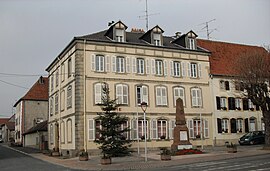Lixheim is a commune of France in the northeastern Moselle department of Grand Est, a kilometre southeast of another commune, Vieux-Lixheim.
Lixheim | |
|---|---|
 The town hall in Lixheim | |
| Coordinates: 48°46′32″N 7°08′34″E / 48.7756°N 7.1428°E | |
| Country | France |
| Region | Grand Est |
| Department | Moselle |
| Arrondissement | Sarrebourg-Château-Salins |
| Canton | Phalsbourg |
| Intercommunality | CC du Pays de Phalsbourg |
| Government | |
| • Mayor (2020–2026) | Christian Untereiner[1] |
| Area 1 | 3.96 km2 (1.53 sq mi) |
| Population (2021)[2] | 577 |
| • Density | 150/km2 (380/sq mi) |
| Time zone | UTC+01:00 (CET) |
| • Summer (DST) | UTC+02:00 (CEST) |
| INSEE/Postal code | 57407 /57635 |
| Elevation | 268–336 m (879–1,102 ft) (avg. 350 m or 1,150 ft) |
| 1 French Land Register data, which excludes lakes, ponds, glaciers > 1 km2 (0.386 sq mi or 247 acres) and river estuaries. | |
History
editThe first Lixheim (now Vieux-Lixheim) was founded by a Benedictine priory in the 12th century.
The new town was founded by Count Palatine George Gustavus in 1608 to replace Phalsbourg, which his father Count Palatine George John I had had to cede. In their small principality of the county of Lutzelstein (La Petite-Pierre), the Counts Palatine wanted to create fortified towns capable of accommodating their Reformed co-religionists, who had been expelled from the Duchy of Lorraine.[3]
Nevertheless, Lixheim was sold to the Duke of Lorraine in 1623; despite his commitment to freedom of Protestant worship, Duke Henry II The Good did little to resist the pressures that drove many of the Reformed inhabitants into exodus.[4]
In 1629–1660, Lixheim and Phalsbourg formed the short-lived principality of Phalsbourg and Lixheim, for the benefit of Henriette de Lorraine and her three successive husbands, including Louis de Guise. The princess had coins minted in Lixheim.[3]
On the death of the princess, the principality's territories reverted to the Duchy of Lorraine. Duke Leopold observed in his own way the tolerance promised by Henry II: the Reformed were allowed to worship in the neighboring county of Nassau-Sarrewerden (Alsace bossue), a modest but commendable concession from a sovereign whose House had always fiercely defended Catholicism.[3]
See also
editReferences
edit- ^ "Répertoire national des élus: les maires". data.gouv.fr, Plateforme ouverte des données publiques françaises (in French). 2 December 2020.
- ^ "Populations légales 2021" (in French). The National Institute of Statistics and Economic Studies. 28 December 2023.
- ^ a b c "Principauté de Lixheim". Vosges Matin. 20 March 2020.
- ^ "Lixheim (Liexheim)". Archives de Moselle.
External links
edit- Media related to Lixheim at Wikimedia Commons



